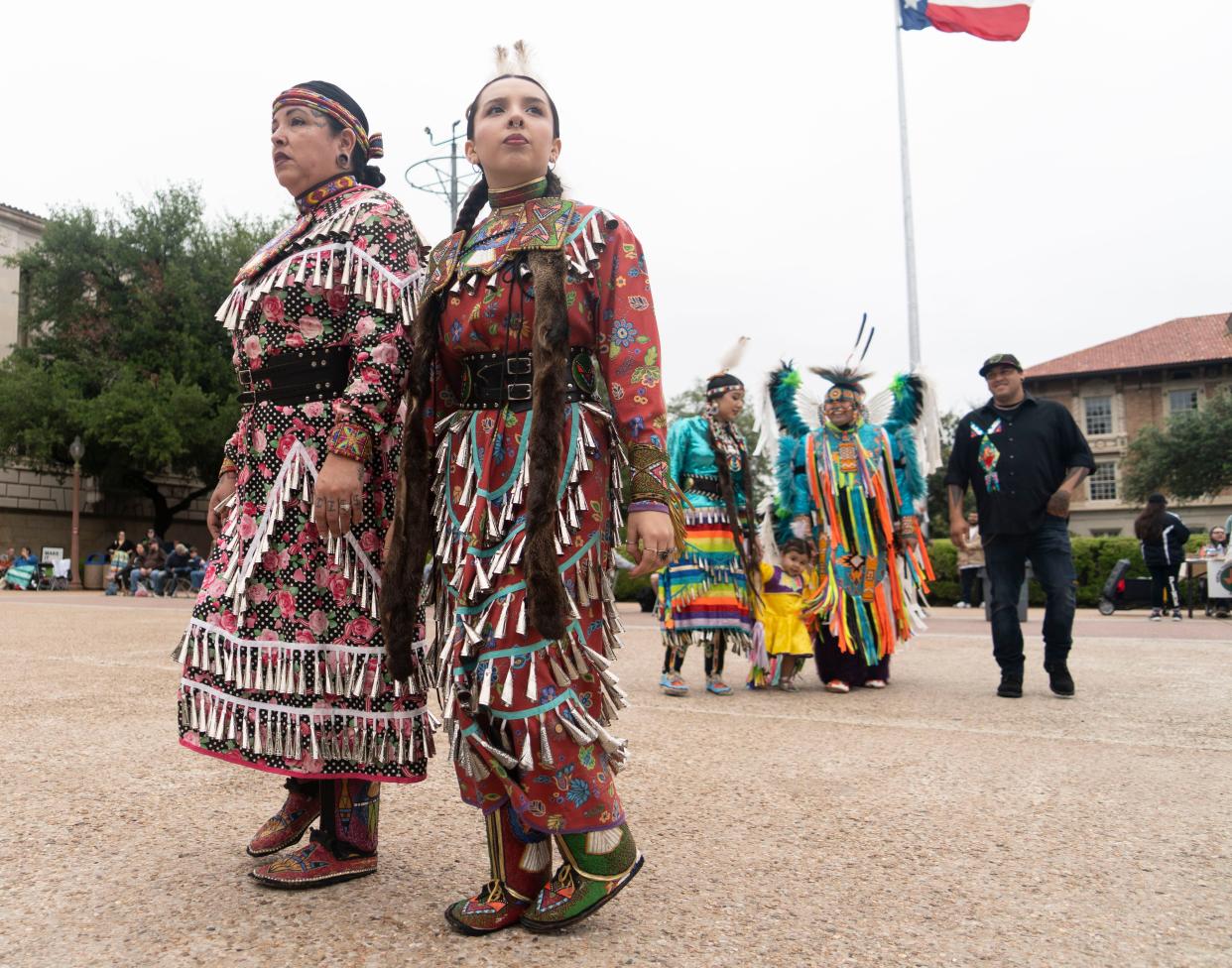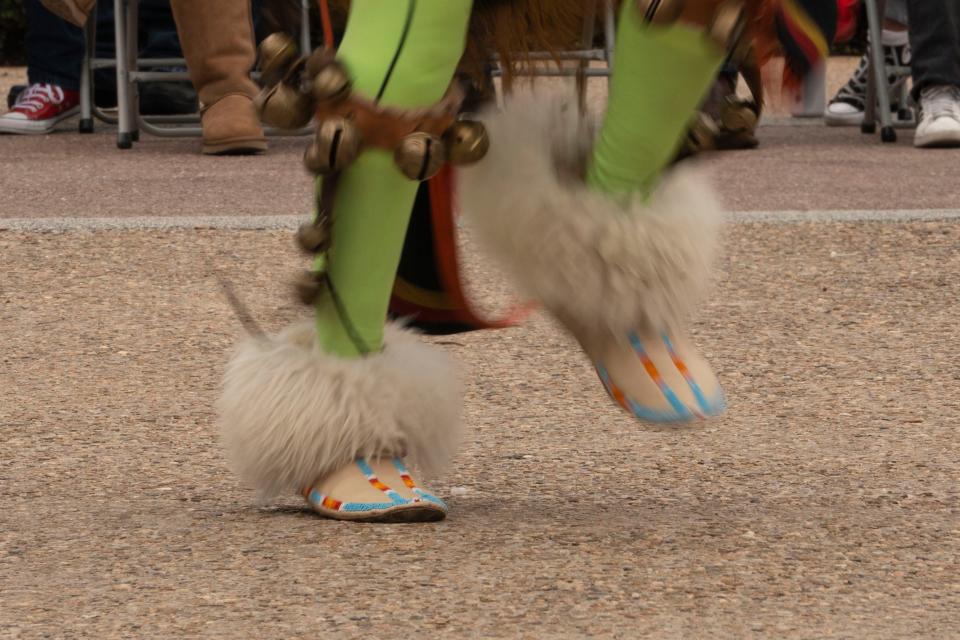'An act of resistance': UT Indigenous students to host large powwow off campus amid SB 17

In the months since Texas' anti-DEI law went into effect, the Native American Indigenous Collective at the University of Texas has found itself without university funding, space or staff support.
But the collective's members do have each other.
“Honestly, we’re even stronger,” said Raven Price-Smith, co-director of the collective from the Mandan, Hidatsa and Arikara tribes. “We thought we were going to struggle to survive, but we're really thriving.”
Next Sunday, after months of planning and fundraising without help from UT, the collective will hold an all-day powwow off campus as a sacred celebration of culture and togetherness.
The collective, previously sponsored by UT and housed under the school's Multicultural Engagement Center, held a powwow last year in front of the UT Tower but said the university is now limiting what the group can do on campus.
“We didn't think it was right to change the way we are for the university,” Price-Smith said.
More: Native American students to bring back UT Austin powwow after roughly 5 years
This year, with help from community partners such as the Great Promise for American Indians and American Indians in Texas, the powwow will be much larger, Price-Smith said.
The celebration will have dancers from both northern and southern Indigenous tribes, Native vendors, face painting, fry bread, informational booths hosted by various Indigenous organizations and two drum groups.
Kennedy Cortez, a senior at UT and co-director of NAIC from the Nahua tribe Indigenous to Mexico, said that the vendors, which the student Indigenous collection could not have at its powwow at UT last year, will have beads, plant medicine and supplies for regalia available this year ― important cultural items that are hard to find at stores.
Cortez said different departments of the university were initially planning to support the group in organizing its powwow this year, but the students were later told that UT couldn't participate after Senate Bill 17, which bans diversity, equity and inclusion offices and initiatives at public universities and colleges, went into effect Jan. 1.
"Whenever people hear that we're a student organization, they automatically think that the university is helping us, but they are not — at all," Cortez said. "It's like a whole job to put on a powwow, and then to simultaneously be in school at an institution that clearly does not support you is traumatizing, honestly."
The university declined an American-Statesman request for comment.
More: When UT students return, 'a home away from home' will have been shuttered due to DEI ban
Cortez said the group's resistance is possible because of community support, which has "held" them through this.
“Regardless of how hard it is, we are doing something that our ancestors have fought for,” Cortez said. “They fought for us to be here, and we are continuing to thrive despite all of the oppression.”
Price-Smith, a third-year student, came to UT looking for community. Since she found NAIC, she’s been helping it expand after the COVID-19 pandemic caused its membership to plummet.
“Identity is really important to all of us,” Price-Smith said. “My goal was to make sure that any new freshmen didn't have the same struggles and have the same trouble finding us.”
More: What UT lost with SB 17: American-Statesman's guide to changes due to Texas' anti-DEI law
Price-Smith said her goal is to preserve the collective to help educate people about the Indigenous communities on campus.
“It really hurts,” she added. “You are Native, but there are still people, still a lot of people, that don’t know that you exist.”
Xochimilo Murguia Vazquez, a third-year student from the southern tribes Nahua and Purépecha who serves as the NAIC’s community engagement officer, said that growing up, they had never been to a powwow. Now, however, the celebration has an incredible meaning for them.
“Having a powwow, and just seeing all these other Indigenous brown faces, all these other people who are speaking and thinking like you, it’s just so nurturing,” Murguia Vazquez said. “Like medicine to your heart and soul.”
The powwow, standing in contrast to the government, the patriarchy and colonialization, can represent “an act of resistance” and strength passed down through generations, Murguia Vazquez said.
Murguia Vazquez is part of an Indigenous prayer dancing group that will dance and pray at the powwow for two hours. Their hope for the powwow is for people to see the beauty and the resilience of the community.
“Putting up a powwow could be an act of strength, an act of pride, saying we are people and this is the beautiful culture that we have passed down from our ancestors,” Murguia Vazquez said. “We have every right to live this and uphold this culture that is ours.”
Moving forward, the NAIC is raising money to sustain its organization and looking for volunteers and legal support as students continue to navigate and fight against SB 17. The collective's GoFundMe account had raised more than $3,200 of its $8,000 goal as of Sunday afternoon.
“Nobody asked for SB 17,” Murguia Vazquez said. “Having legal representation (can) have people feel more comfortable speaking up against something that seems to be impossible to touch.”
The powwow will be held from 11 a.m. to 7 p.m. Sunday at the Delores Duffie Recreation Center at 1182 N. Pleasant Valley Road in East Austin. Admission is free.
Everybody is welcome, but Price-Smith said she hopes students in particular turn out to learn about issues affecting Indigenous communities.
“SB 17, it’s really trying to erase all these different diversity resources and student orgs,” Price-Smith said. “This is really taking a stand and showing who we are and all the community that we can have.”

This article originally appeared on Austin American-Statesman: After Texas banned DEI at colleges, UT Native students expand powwow
Solve the daily Crossword

